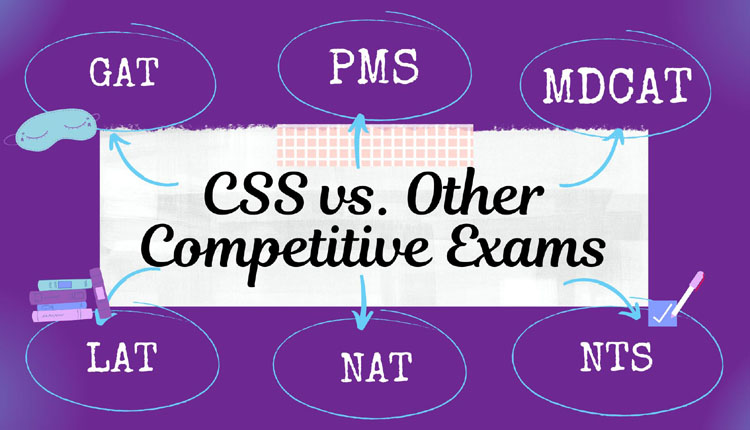CSS vs. Other Competitive Exams in Pakistan: Pros and Cons
Introduction
Competitive exams play a critical role in shaping the future of thousands of students in Pakistan. The exams not only determine their future academic and career paths but also affect their overall personal growth. The two most popular competitive exams in Pakistan are the Civil Superior Services (CSS) exam and the Provincial Management Services (PMS) exam. In this blog, we will compare and contrast the CSS exam with other competitive exams in Pakistan and discuss their pros and cons.
Pros and Cons of CSS Exam
Pros:
Prestige and Job Security:
The CSS exam is the most prestigious exam in Pakistan, and passing it can open up many job opportunities in the civil service, including the Police, Customs, Foreign Service, and many others. The CSS exam also offers job security and stability, which is a major advantage over other competitive exams.
Nationwide Acceptance:
The CSS exam is accepted and recognized nationwide, which means that candidates can apply for jobs anywhere in Pakistan. This is a significant advantage over other competitive exams, which may only be recognized in certain provinces or regions.
Read also: The Backbone of Public Service: Why Honesty is a Key Duty for CSP Officers
Diverse Range of Subjects
The CSS exam covers a diverse range of subjects, including History, International Relations, Political Science, Economics, and many others. This means that candidates can choose subjects that align with their interests and strengths, increasing their chances of success.
Cons:
High Level of Competition
The CSS exam is highly competitive, with thousands of candidates competing for a limited number of seats. This means that candidates have to work extremely hard to stand out from the crowd, which can be challenging and stressful.
Difficult Exam Pattern
The CSS exam has a challenging exam pattern, with six compulsory papers and six optional papers. This means that candidates have to prepare for a wide range of topics and subjects, which can be overwhelming.
Read also: The Top 10 English Grammar Rules You Need to Know
Time-Consuming Process
The CSS exam is a time-consuming process that can take up to two years to complete. This means that candidates have to dedicate a significant amount of time and effort to the exam, which can be a major drawback for those who are already working or have other commitments.
Pros and Cons of Other Competitive Exams
PMS Exam:
Pros:
Regional Advantage
The PMS exam is recognized in the specific province where it is conducted, which means that candidates who are interested in working in a particular province can benefit from this exam.
Lower Level of Competition
The PMS exam is less competitive than the CSS exam, which means that candidates have a higher chance of success.
Lower Exam Pattern
The PMS exam has a simpler exam pattern than the CSS exam, with only three compulsory papers and one optional paper. This means that candidates have to prepare for fewer topics and subjects, which can be less stressful.
Cons:
Limited Job Opportunities
The PMS exam only offers job opportunities in the provincial civil service, which means that candidates may have fewer options than those who pass the CSS exam.
Check also: World General Knowledge MCQs
Regional Limitations
The PMS exam is limited to a specific province, which means that candidates who want to work in other provinces may face limitations.
Lower Prestige
The PMS exam is not as prestigious as the CSS exam, which means that candidates may not receive the same level of recognition or respect.
Other Competitive Exams:
There are several other competitive exams in Pakistan, including the Central Superior Services (CSS) Exam, the Pakistan Army Long Course, the Law Graduate Assessment Test (LAT), and many others. Here are some of the pros and cons of these exams:
Pros:
Specific Job Opportunities
Some exams, such as the Pakistan Army Long Course or the LAT, offer specific job opportunities in their respective fields.
Lower Level of Competition
Some exams, such as the LAT or the National Aptitude Test (NAT), are less competitive than the CSS exam, which means that candidates have a higher chance of success.
Shorter Time Frame
Some exams, such as the LAT, are shorter and less time-consuming than the CSS exam, which means that candidates can complete them faster.
Cons:
Limited Job Opportunities
Some exams, such as the NAT, do not offer job opportunities on their own, but rather provide a score that can be used to apply for various jobs.
Limited Acceptance
Some exams, such as the LAT, may only be accepted by certain universities or organizations, which means that candidates may face limitations in their job or academic options.
Limited Scope
Some exams, such as the NAT, may only test candidates on specific subjects or skills, which means that they may not offer a comprehensive assessment of a candidate’s abilities.
Read also: Avoiding Common Mistakes in English Precis Writing
Conclusion
In conclusion, the CSS exam and other competitive exams in Pakistan each have their own pros and cons. The CSS exam offers prestige, job security, and nationwide acceptance, but is highly competitive, has a difficult exam pattern, and is a time-consuming process. Other competitive exams, such as the PMS exam, offer regional advantages, lower competition, and simpler exam patterns, but may have limitations in job opportunities, acceptance, and prestige. Candidates should carefully consider their personal goals, strengths, and limitations when deciding which exam to take. Ultimately, hard work, dedication, and a strategic approach to exam preparation can help candidates succeed in any competitive exam they choose.










[…] Read also: CSS vs. Other Competitive Exams in Pakistan: Pros and Cons […]